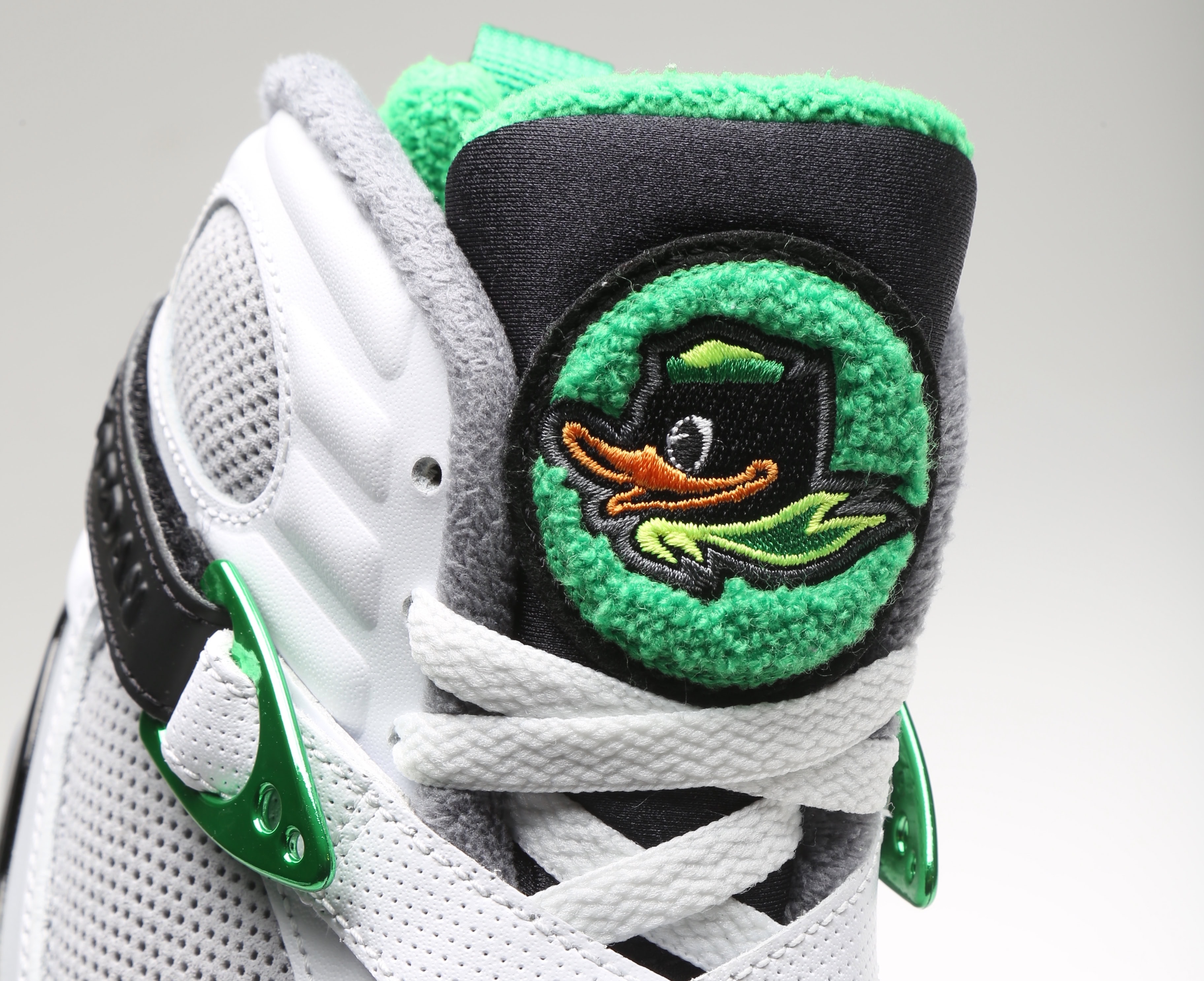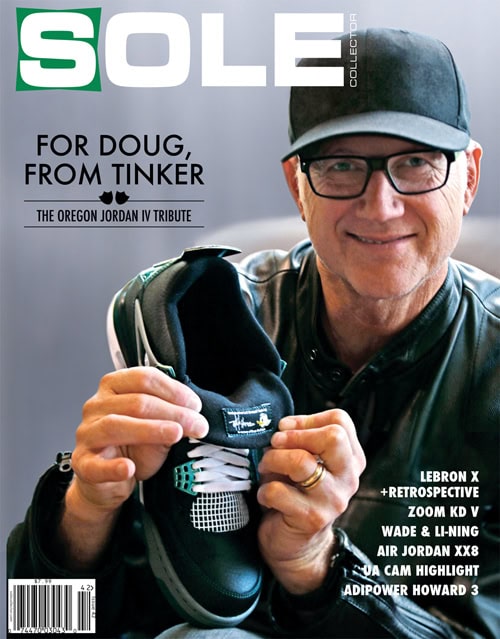The legendary designer has helped Nike and Oregon continue to set the standard in everything from footwear to athlete empowerment in the NIL era.
“Boy, I started getting calls,” laughs Tinker Hatfield over the phone.
It’s become an annual tradition. Each year, the legendary Air Jordan (and Air Max, and Air Trainer, etc…) designer works up a new player exclusive Retro colorway for the Oregon Ducks football team, and each year, his phone blows up as soon as it’s unveiled.
In years past, Hatfield has worked up green-and-yellow accented executions of the earliest Js that he designed at the height of Michael’s ascent, including Airs 3 through 7. Ahead of the Ducks’ latest trek to a Bowl Game, players received a white/grey-based Air Jordan 8 with chrome green strap clips and added detailing throughout.
Typically, Jordan Brand will make just a couple hundred pairs, with the bulk of the batch going to current Ducks student-athletes, and a few dozen extras going to “friends of the program,” as Tinker likes to call it.

This year, there was an entirely new approach.
With players now able to profit off their name, image, and likeness rights, Nike produced an extra 100 pairs to be auctioned off on StockX at the start of the month, with the proceeds planned to be split among each of the current Oregon football players.
The unique NIL agreement is technically between StockX and Division Street, the company created by Nike founder Phil Knight and a team of former Nike execs that is tasked with helping Oregon student-athletes create and monetize their personal brands.
The auction concept was an immediate success.
According to StockX, the combined price of all 100 auctions tallied more than $380,000 in total, with an average selling price of $3,885 per pair. Over 7,000 bids were placed during the 48-hour auction window, with the top sale fetching $17,000 for a size 11.5 pair.
According to Hatfield, a former Duck student-athlete himself, this is “just the tip of the iceberg.” Additional progressive and innovative NIL formats and concepts are planned to benefit Oregon student-athletes and help create an excitement around the school for future athletes to notice.
Boardroom spoke with Hatfield about the auctions, the NIL era, and the changing landscape of college athletics.
NICK DEPAULA: How did the idea come about, and what was your excitement level around utilizing a shoe in a new way that would benefit the athletes?
TINKER HATFIELD: There’s a new charter out there to help these athletes, and because of the rule change, there’s an opportunity to do something new and different that really helps athletes navigate through the rule changes and ultimately make some more money for their education and their future.
As we know, not very many Division I athletes in college end up being pros at the highest level. And it’s a risky business going out there and risking injury. The number of hours [involved], I remember personally being a Division I, full-ride scholarship athlete, and never having a cent in my pocket. It’s kind of a misnomer that it’s a free ride – it’s definitely not.
We’re trying now to do something a little different to create some excitement around the Jordan Brand, the Oregon brand, and of course, the Nike brand. We’re trying to help athletes set themselves up for a better future, period.

ND: From a big-picture standpoint, how exciting was it to see the rules change? How long have you been looking to do something like this?
TH: I have to say, Phil Knight is the big driver behind this. He’s so passionate about athletes in general, and he doesn’t just support the University of Oregon because he wants to win, he really cares about the athletes. So do I and other folks that we work with at Nike and at the University of Oregon. As a matter of course, we’ve always been trying to figure out how to help athletes, within the rules.
Once the rules changed, it certainly opened up the ideation process, to go beyond what we had been doing. I have to give Phil all the credit in the world. He put together Division Street. He’s the driver and he’s passionate about sports, he’s passionate about athletes and he’s passionate about helping young people.
He’s also passionate about telling stories. I would consider it a bit of a lost art, to make it a bit more personal and promote a bigger family feel around these big sports institutions, which are really universities.
ND: How exciting has it been to see Division Street get started and make an impact for the current Ducks athletes?
TH: Well, [Division Street CEO] Rosemary St. Clair is one of my favorite employees of all time at Nike. She’s just been a very smart and strong leader at Nike [as VP & GM of Nike Women], and now that she’s at Division Street, she’s doing the same thing. She’s clever, and she’s also a strong decision-maker. She’s got some real passion for helping these athletes.
She’s the CEO there, and I still work at Nike, and I’ve been thinking, ‘Hmm, maybe I should go work at Division Street.’ [Laughs] The reality is we need to have strong voices at Nike, and I’m one of those, so I don’t think they want me to vacate that side of it though.
ND: Do you see this launch being something that other schools look to replicate across the country?
TH: Yeah, I think so. I think the goal here for Nike, for Phil Knight and myself, is to further the University of Oregon brand, but that’s really only the tip of the iceberg. We know that whatever we do with Oregon that works, gets replicated. The University of Oregon is an open-minded institution that is willing to try new and different things, which is not true across the country, at all.
We’re trying to set a future standard, and so far, a lot of what we do for the University of Oregon does get copied in some way. That’s good. Somebody has to have an idea, someone has to execute on that idea, and someone has to be willing to allow you to execute on that idea. All of those things figure in, and the University of Oregon is a great partner for that.
I can’t think of any universities that have such a progressive, open-minded approach, and that makes Oregon special. We’re sort of punching above our weight at the University of Oregon. The reason for that is because of open-mindedness, the willingness to be innovative, and to try things that other people just simply won’t. So, here we are.

ND: This is such a heated debate – but what are your favorite Ducks PEs over the years?
TH: Oh, man, that’s a tough one. I will tell you, this latest one – with the Black chenille Duck patch – when I started showing it around to some people that are younger than myself or were ex-players, they were all going, ‘This is super strong. This is really great.’ This one may be my favorite.
It’s a little bit more daring to do something like that, and we’re actually messing with the logo a little bit with the Duck. It’s what I would consider a very nuanced message that is pro diversity. Some people are afraid to engage in that arena, and we’re not trying to be controversial, but it’s nice to be able to try some things like this, and it probably is my favorite of all of the PEs.

My second favorite would be the Jordan IV that I did that was a tribute to Doug McClain, one of my very best friends who passed away. He was one of those Ducks fans that went to games no matter whether the Ducks were 10-1 or 2-10, you know what I mean?
After all of those years, he unfortunately passed away, and I thought it was worth telling a story to the athletes, about the fact that they do come and go, but there are lifelong supporters of the program that are there day in and day out, no matter if it’s raining or if their record isn’t good. Doug was one of those people and I think it was a good lesson for the athletes.
ND: To go from where the shoes were ending up on eBay and they were supposed to be for the students, to now, seeing what you’re able to do within the new rules to have an auction that can benefit the students first. It’s been cool to see how it’s evolved through the years.
TH: There’s an evolution in our thinking, and the rule changes have made a big difference. We spend a lot of time and effort to put these limited edition Jordans together with the Oregon component. At first, when I started hearing about kids selling them right away or after, if they had finished up their eligibility as athletes and could sell them, I was like, ‘Oh man, they’re not very loyal to the school.’
Over the ensuing years, I realized, and I thought about myself, and it’s hard to get a starting point in life, even with a college degree. The world is a difficult place to put a stake in the sand and get to somewhere new and different. I understand it better now, and now I think we can put these projects together with this additional purpose.
It’s our job to make sure that these stay limited and somewhat exclusive, so that the prices through StockX do truly benefit the student-athletes. We always have this big list of people who want these shoes, and oftentimes, they’re professional athletes who went to other schools.
ND: I’ll never forget when you said, ‘Hey, you went to Syracuse!’

TH: ‘You went to Texas, didn’t you? [Laughs] And you want Oregon stuff?’ Which, you can probably guess who I’m talking about. The reality is, it’s interesting that we’ve been able to build a brand at the University of Oregon that does allow it to punch above its weight class and where it normally would be. In all sports, not just in football.
Even in the face of some bad luck with injuries and losing a coach, this is actually a real positive for the University of Oregon to get its swagger back. Even though they’re just sneakers, on the other hand, it does generate interest and excitement around the Oregon brand.
ND: I think you know more than anyone else, it’s never just sneakers.
TH: I’ve been in this business now so long, and I’ve learned it from you too, Nick. I tried to be purposefully oblivious to it, because it wasn’t my job to get too caught up in it. Now that I’ve been through this so many times, I’m like, ‘Wow, this is just fascinating.’
I was just trying to do good design work, tell stories, and do our charter, which is to help athletes perform and create some kind of narrative around it, so that there was more meaning behind it than just an object.